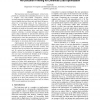Free Online Productivity Tools
i2Speak
i2Symbol
i2OCR
iTex2Img
iWeb2Print
iWeb2Shot
i2Type
iPdf2Split
iPdf2Merge
i2Bopomofo
i2Arabic
i2Style
i2Image
i2PDF
iLatex2Rtf
Sci2ools
112
click to vote
ISCA
2005
IEEE
2005
IEEE
Store Vulnerability Window (SVW): Re-Execution Filtering for Enhanced Load Optimization
The load-store unit is a performance critical component of a dynamically-scheduled processor. It is also a complex and non-scalable component. Several recently proposed techniques use some form of speculation to simplify the load-store unit and check this speculation by re-executing some of the loads prior to commit. We call such techniques load optimizations. One recent load optimization improves load queue (LQ) scalability by using re-execution rather than associative search to check speculative intra- and inter- thread memory ordering. A second technique improves store queue (SQ) scalability by speculatively filtering some load accesses and some store entries from it and re-executing loads to check that speculation. A third technique speculatively removes redundant loads from the execution engine; re-execution detects false eliminations. Unfortunately, the benefits of a load optimization are often mitigated by re-execution itself. Re-execution contends for cache bandwidth with st...
| Added | 25 Jun 2010 |
| Updated | 25 Jun 2010 |
| Type | Conference |
| Year | 2005 |
| Where | ISCA |
| Authors | Amir Roth |
Comments (0)

